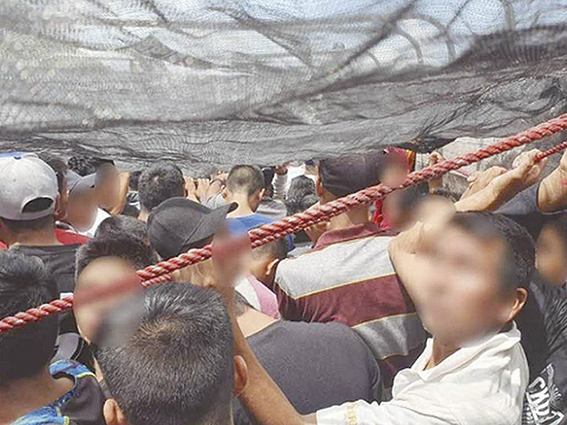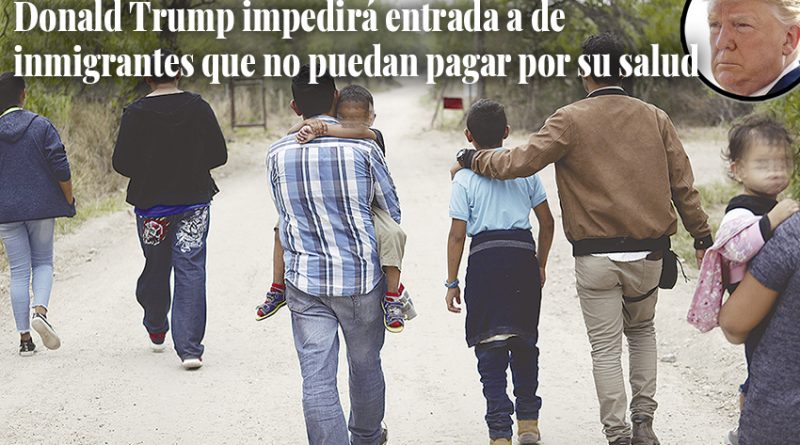Trump suspends entry of immigrants who cannot pay for healthcare
El mandatario firmó una orden para que el personal consular otorgue visados solamente a quienes puedan probar que “no impondrán una carga sustancial” al sistema sanitario estadounidense
El presidente Donald Trump ha ordenado a los consulados estadounidenses que denieguen visados de entrada al país a aquellos inmigrantes sin seguro médico o que no puedan pagar por su salud, según anunció este viernes la Casa Blanca. Se trata de la última medida que promueve Trump dentro de su estrategia para reducir tanto la inmigración irregular como la legal.
En una proclamación, el Presidente ordenó a los funcionarios consulares exigir a los solicitantes de visas que demuestren tener “los recursos financieros para pagar los costos médicos” mientras estén en Estados Unidos o que “estarán cubiertos por un seguro médico aprobado”. La medida debe entrar en vigor a partir del próximo 3 de noviembre.
“Si bien nuestro sistema de atención médica enfrenta los desafíos causados por la atención médica no pagada, el Gobierno de EE.UU. está agravando el problema al admitir a miles de extranjeros que no han demostrado capacidad alguna para costear sus gastos médicos”, afirmó Trump en la proclamación.
Para probar su tesis, el mandatario defendió que “los datos muestran que los inmigrantes legales tienen una probabilidad tres veces mayor que los ciudadanos de Estados Unidos de carecer de seguro médico”. “Los inmigrantes que ingresan a este país no deberían ser una carga para nuestro sistema de salud y, en consecuencia, para los contribuyentes estadounidenses”, concluyó.
Además de las variadas estrategias para reducir la inmigración irregular en la frontera con México, el Gobierno de Trump también está poniendo el foco en reducir la migración legal. El pasado 12 de agosto, presentó un reglamento que permitirá rechazar permisos de residencia permanente en Estados Unidos a los inmigrantes legales que las autoridades consideren que se han convertido en una “carga pública” para el país.
Bajo esta nueva normativa, un inmigrante legal será definido como “carga pública” si recibe “uno o más beneficios pú- blicos designados” durante más de 12 meses en un período de 36 meses. Estos beneficios públicos incluyen asistencia alimentaria, ayuda a la vivienda o programas que subsidian el elevado costo de los medicamentos.

ENGLISH
The White House issued a presidential proclamation on Friday night requiring many future immigrant visa applicants to show they can afford health care, a move that could make it harder for poor migrants to enter the U.S.
The action, which is set to take effect in 30 days, would require applicants, including people with ties to family members in the U.S., to show they have health insurance or prove their financial ability to pay for medical care before being issued a visa that could lead to a green card.
The proclamation wouldn’t apply to noncitizen children of U.S. citizens. Refugees and immigrants who won asylum are also excluded from the new requirement. The Wall Street Journal first reported on the proclamation shortly before it was released.
The move marks the latest effort by President Trump to restrict immigrants’ ability to enter the U.S.
The administration is poised to implement a rule this month that would require many of the same applicants to demonstrate that they wouldn’t become reliant on public benefits including Medicaid should they be allowed to immigrate to the U.S.
The new requirement would take a further step, requiring anyone looking to move to the U.S. to enroll in private insurance — including as a dependent on a family member’s health plan — or possess the financial means to cover significant medical costs.
The proclamation also allows entry into the U.S. for migrants who have the “financial resources to pay for reasonably foreseeable medical costs, ” but it doesn’t define the threshold for meeting that standard.
Subsidized plans purchased on the Affordable Care Act insurance exchanges wouldn’t count as an eligible form of insurance under the White House’s new definition.
Low-income immigrants living in the country legally can’t use Medicaid for their first five years, but they can receive premium subsidies if their incomes are low enough. Under the new White House policy, purchasing health insurance using subsidies would disqualify people from living in the country legally.
“It’s classic Catch-22 for low-income immigrants,” said Larry Levitt, executive vice president at the Kaiser Family Foundation. “They’re eligible for subsidized health coverage through the ACA, but applying for that subsidized coverage means they can’t legally be in the country.”
The administration, in its 2017 tax overhaul, moved to relieve American citizens from an ACA mandate requiring them to have health coverage or pay a penalty.
In its proclamation, the White House said it was taking the additional step to safeguard the health-care system for American citizens by preventing immigrants from enrolling in Medicaid or going to emergency rooms with no insurance, requiring hospitals or taxpayers to cover the cost.
“President Trump has taken action to promote immigrant self-sufficiency, which has long been a fundamental aspect of our immigration system,” the proclamation said.
The new requirement will apply to potentially hundreds of thousands of people moving to the U.S. each year on immigrant visas, which allow people to become permanent residents. In the 2018 fiscal year, the U.S. issued a total of roughly 534,000 visas, a 4.6% decline from the previous year’s total, according to State Department data.
Some of those visas, like those granted to noncitizen children of U.S. citizens, won’t need to comply with the new requirement.
The U.S. issues about 1.1 million green cards a year, but people issued immigrant visas often wait years in backlogs before they are granted permanent resident status.


 (1) (2).jpg)


Debe estar conectado para enviar un comentario.